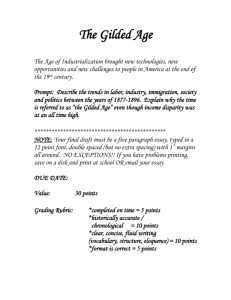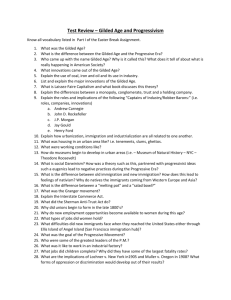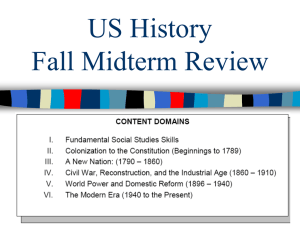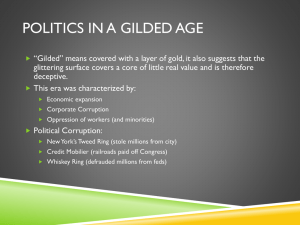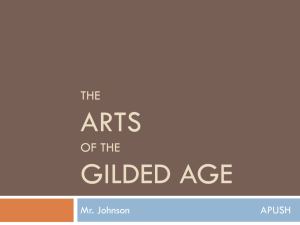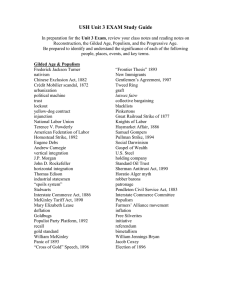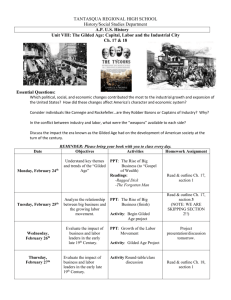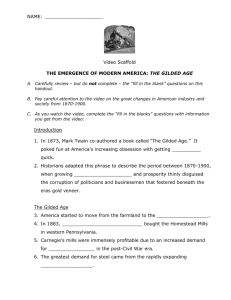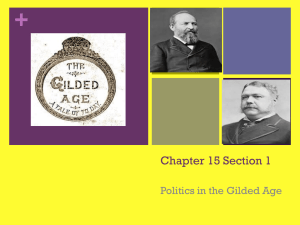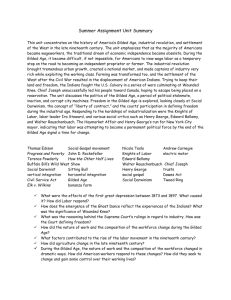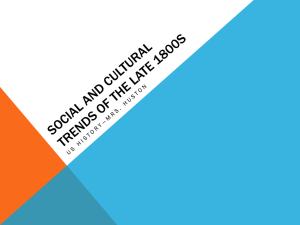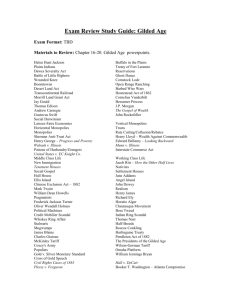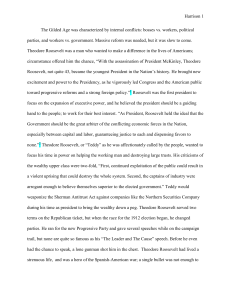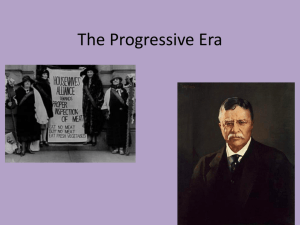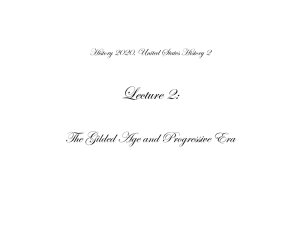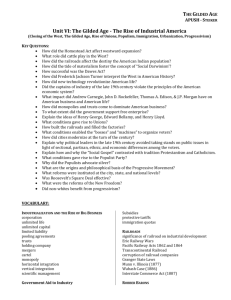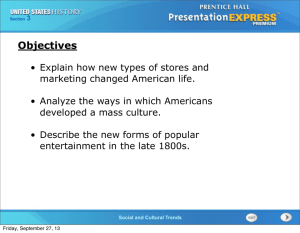Gilded Age and the Progressive Era Below is a guide that may ass
advertisement
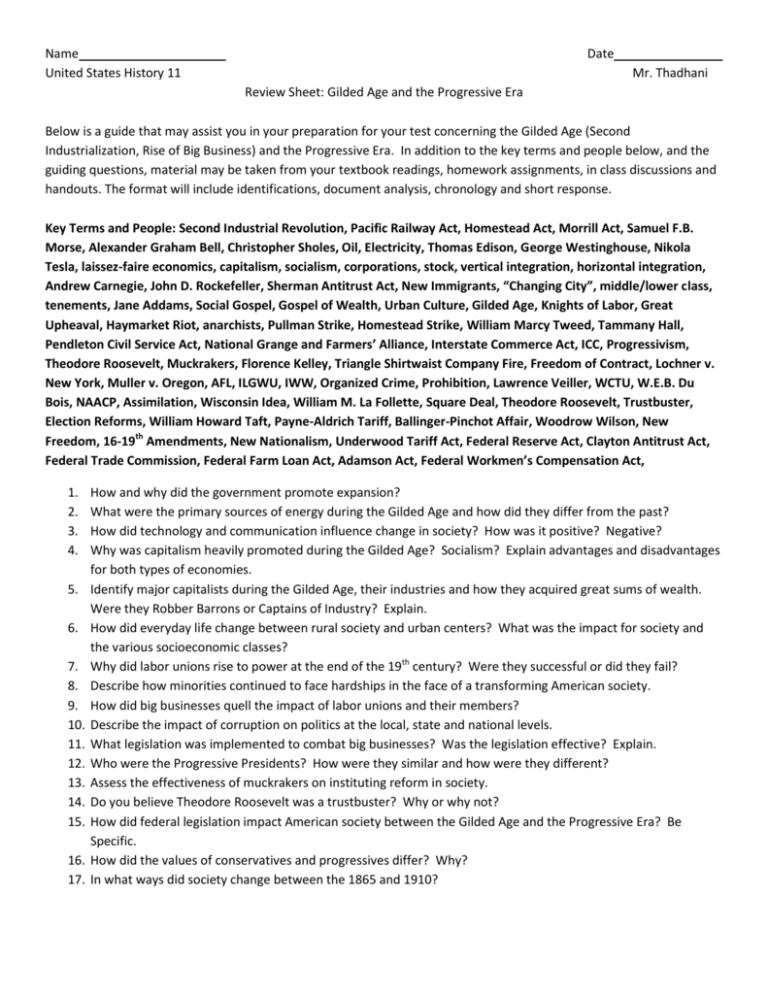
Name United States History 11 Date Mr. Thadhani Review Sheet: Gilded Age and the Progressive Era Below is a guide that may assist you in your preparation for your test concerning the Gilded Age (Second Industrialization, Rise of Big Business) and the Progressive Era. In addition to the key terms and people below, and the guiding questions, material may be taken from your textbook readings, homework assignments, in class discussions and handouts. The format will include identifications, document analysis, chronology and short response. Key Terms and People: Second Industrial Revolution, Pacific Railway Act, Homestead Act, Morrill Act, Samuel F.B. Morse, Alexander Graham Bell, Christopher Sholes, Oil, Electricity, Thomas Edison, George Westinghouse, Nikola Tesla, laissez-faire economics, capitalism, socialism, corporations, stock, vertical integration, horizontal integration, Andrew Carnegie, John D. Rockefeller, Sherman Antitrust Act, New Immigrants, “Changing City”, middle/lower class, tenements, Jane Addams, Social Gospel, Gospel of Wealth, Urban Culture, Gilded Age, Knights of Labor, Great Upheaval, Haymarket Riot, anarchists, Pullman Strike, Homestead Strike, William Marcy Tweed, Tammany Hall, Pendleton Civil Service Act, National Grange and Farmers’ Alliance, Interstate Commerce Act, ICC, Progressivism, Theodore Roosevelt, Muckrakers, Florence Kelley, Triangle Shirtwaist Company Fire, Freedom of Contract, Lochner v. New York, Muller v. Oregon, AFL, ILGWU, IWW, Organized Crime, Prohibition, Lawrence Veiller, WCTU, W.E.B. Du Bois, NAACP, Assimilation, Wisconsin Idea, William M. La Follette, Square Deal, Theodore Roosevelt, Trustbuster, Election Reforms, William Howard Taft, Payne-Aldrich Tariff, Ballinger-Pinchot Affair, Woodrow Wilson, New Freedom, 16-19th Amendments, New Nationalism, Underwood Tariff Act, Federal Reserve Act, Clayton Antitrust Act, Federal Trade Commission, Federal Farm Loan Act, Adamson Act, Federal Workmen’s Compensation Act, 1. 2. 3. 4. 5. 6. 7. 8. 9. 10. 11. 12. 13. 14. 15. 16. 17. How and why did the government promote expansion? What were the primary sources of energy during the Gilded Age and how did they differ from the past? How did technology and communication influence change in society? How was it positive? Negative? Why was capitalism heavily promoted during the Gilded Age? Socialism? Explain advantages and disadvantages for both types of economies. Identify major capitalists during the Gilded Age, their industries and how they acquired great sums of wealth. Were they Robber Barrons or Captains of Industry? Explain. How did everyday life change between rural society and urban centers? What was the impact for society and the various socioeconomic classes? Why did labor unions rise to power at the end of the 19th century? Were they successful or did they fail? Describe how minorities continued to face hardships in the face of a transforming American society. How did big businesses quell the impact of labor unions and their members? Describe the impact of corruption on politics at the local, state and national levels. What legislation was implemented to combat big businesses? Was the legislation effective? Explain. Who were the Progressive Presidents? How were they similar and how were they different? Assess the effectiveness of muckrakers on instituting reform in society. Do you believe Theodore Roosevelt was a trustbuster? Why or why not? How did federal legislation impact American society between the Gilded Age and the Progressive Era? Be Specific. How did the values of conservatives and progressives differ? Why? In what ways did society change between the 1865 and 1910?
